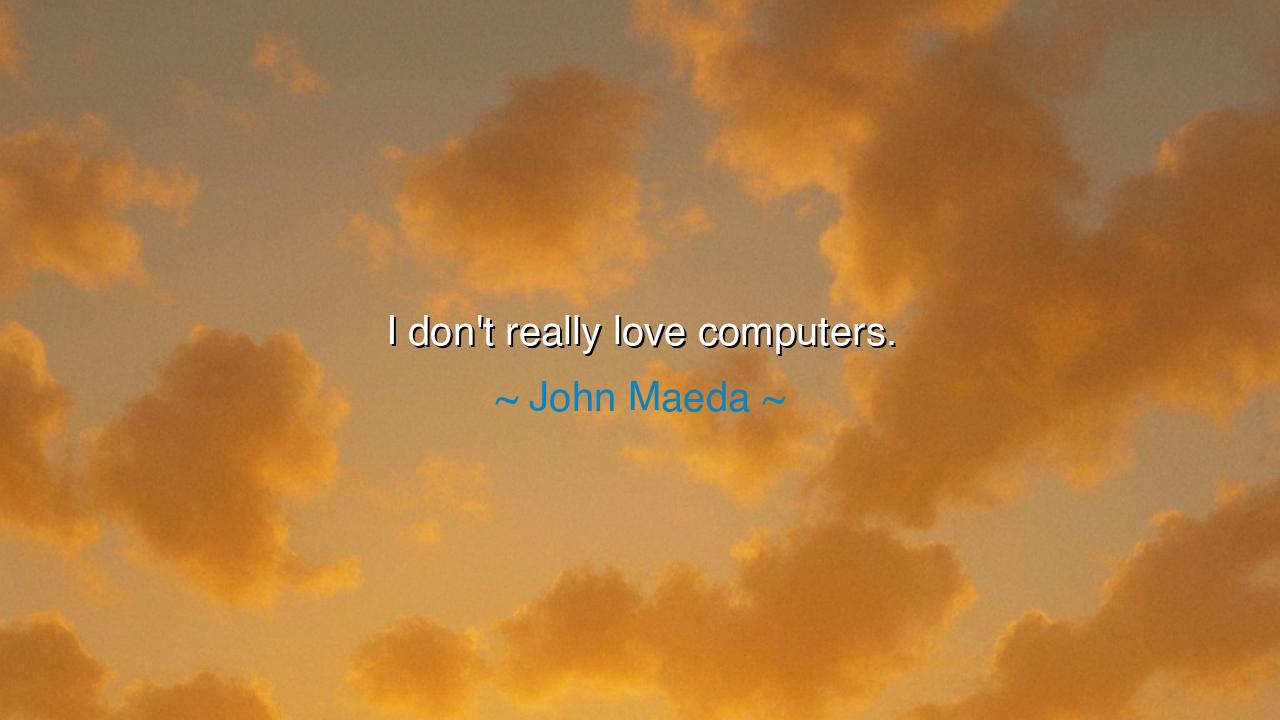
I don't really love computers.






“I don’t really love computers.” — these words, spoken by John Maeda, a designer, artist, and technologist of rare vision, carry the quiet weight of paradox. Here is a man who has spent his life shaping the digital world, yet he confesses detachment from the very tools that defined his craft. In that confession lies a profound truth: the human heart must always remain greater than its inventions. Maeda does not speak in rejection, but in reverence — for he understands that to love the machine too much is to forget the soul that commands it.
In the ancient spirit, his statement recalls the wisdom of those who warned against worshipping one’s own creations. The sculptor must not love his chisel; the musician, his lyre; the warrior, his sword. These are but instruments — extensions of human will. When we begin to love the tool more than the vision it serves, we lose the essence of creation itself. So Maeda’s words are not an insult to technology, but a call to remember that the artist’s heart is the source of all meaning, not the code or circuitry that delivers it.
Throughout history, every age has faced this same test. When the printing press was born, men feared it would destroy the purity of learning. When the camera arrived, painters mourned that truth would be replaced by imitation. Yet it was not the tool that defined the outcome — it was the hand that held it, the mind that guided it, the soul that infused it with purpose. Maeda’s wisdom reminds us that computers, like all tools, are only as noble as the intentions of those who use them.
There is a story told of Leonardo da Vinci, who, in his final years, grew restless and weary of his own machines. His notebooks were filled with sketches of gears, wings, and engines — yet his heart longed not for mechanism, but for meaning. He once said, “Simplicity is the ultimate sophistication.” John Maeda, centuries later, would echo that very belief. For though he is a master of digital art, he speaks often of humanity, of beauty born not from the circuit but from the breath of imagination.
“I don’t really love computers” — in those few words, Maeda reminds us of something sacred: that technology must never replace tenderness. In a world where people grow enamored with screens, where relationships are filtered through light and pixels, he draws a line in the sand. Love, empathy, and inspiration belong to the realm of the human, not the machine. The danger lies not in building computers, but in letting them build us — shaping our hearts in their cold and efficient image.
Yet his statement is not cynical. It carries a note of discipline and balance, the kind that the ancients revered. For true mastery is not born of passion alone, but of understanding limits. The wise sailor does not love the wind, yet he learns to move with it. The great artist does not worship the brush, yet he honors its potential. Maeda’s stance teaches that to truly create with computers, one must neither idolize nor despise them, but stand above them — guiding them with clarity, humility, and grace.
The lesson here is timeless: love not the instrument, but the creation it makes possible. Use your tools, but never let them use you. Let your technology amplify your humanity, not consume it. In all that you build, write, or design, remember the soul — for that is the one element no machine can replicate.
And so, my child of the digital dawn, when you sit before the glowing screen, pause a moment. Feel your heartbeat, not the hum of the machine. Let your hands move not in worship of the keyboard, but in service to the idea within. For John Maeda’s truth will always endure: we were not made to love computers — we were made to love what we can create through them.






AAdministratorAdministrator
Welcome, honored guests. Please leave a comment, we will respond soon